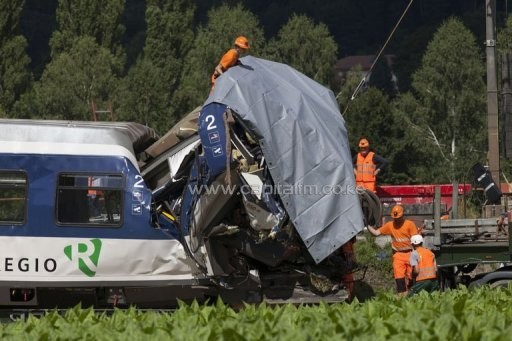Flanked by cornfields, the two mangled trains were still on the track Tuesday, both engines locked into each other and lifted slightly off the ground as workers used beams to prepare to remove them.
Forty six people were believed to have been travelling on the two trains. Police did not rule out the possibility of finding another victim in the wreckage.
“Two adults and a child are still in hospital out of the 23 recorded injured, but their lives are not in danger,” said Jocelyn Corniche, the emergency services’ chief physician.
The relatively slow speed of the southbound train, 40 kilometres (25 miles) per hour, appeared to be one explanation why more people had not died. The speed of the northbound train has yet to be confirmed.
Accident investigators were still trying to understand why the southbound train, operating a slower service between a string of communities, failed to wait for the passage of the faster northbound service, which does not stop at Granges pres Marnand.
Sauterel stressed that the issue of criminal responsiblity for the crash was not under discussion for the moment.
Swiss federal railway company CFF offered its condolences to the dead driver’s family.
“The management and employees of the CFF are shocked by the death of their colleague,” the company said in a statement.
Rescuers had worked into the night under arc lamps, using special equipment to cut through the wreckage and reach the missing driver.
They retrieved his body at 1:30 am (2330 GMT) Tuesday but it was not clear whether he had died on impact.
The collision came in the wake of the July 24 tragedy in Santiago de Compostela, when a speeding train flew off the rails, killing 79 people. A crash in suburban Paris a week earlier left seven dead.
“It makes your blood run cold,” Swiss resident Antonez said, referring to the string of rail accidents in Europe.
Two regional trains collided at Neuhausen am Rheinfall in northern Switzerland in January, resulting in 25 people suffering light injuries.
In 2003, 45 people were injured in a train crash in Zurich.









































